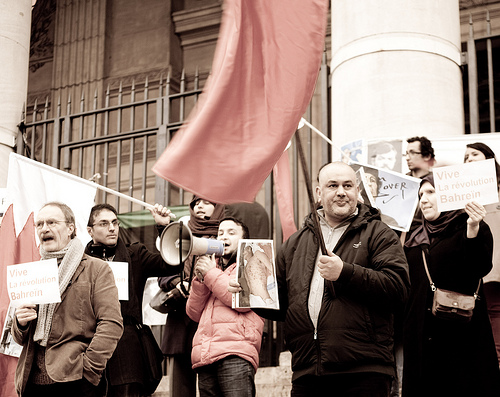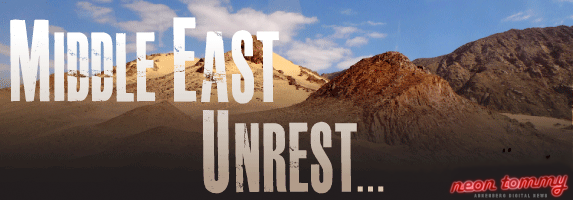Bahrain: Opposition Leader Denied Reentry As Protesters Mourn Deaths
Bahrain's opposition party leader Hassan Mushaimaa said he has been barred from reentering the country, as demonstrators continue to mourn the death of seven people killed in a government crackdown on protests last week.
Mushaimaa - the leader of the Haq Movement - said he was unable to return to Bahrain after being detained in Lebanon.
It is widely suspected that the Bahraini government is deliberately blocking Mushaimaa's return as anti-government protests continue to consume the small island country.
However, a Bahraini government spokeswoman, Maysoon Sabkar, said Thursday that Mushaimaa is not wanted anymore and is allowed to return to the country, according to CNN.
Fifty protesters were also released earlier this week, as reports indicate informal talks between both pro- and anti-government factions have begun.
HISTORY OF THE PROTESTS
Starting in late 2009, Shiites in villages around the nation have held regular protests, demanding the release of political prisoners. Protesters also asked for Shiites to play a larger role in the military where Sunnis currently have command positions. These protests, though, gained little media attention.
Anti-government protests gained momentum on February 14 with a “Day of Rage.” During the “Day of Rage” around 100,000 demonstrators gathered in Pearl Square.

The protestors were part of the nation’s Shiite majority. They asked for democratic reform and complained that Shiites faced discrimination and persecution.
Originally the government used security forces to clear protestors from Manama’s Pearl Roundabout, the symbolic center of the city. Police fired on demonstrators with tear gas and rubber bullets. The government is saying that as a result, seven were killed and 25 hospitalized, according to Daily Mail. Opposition groups say the number of hospitalizations is closer to 200.
On Saturday, though, demonstrators were allowed to converge at the Pearl Roundabout after the Police withdrew under heavy pressure from the U.S.
The Crown Prince, Salman bin Hamad Al Khalifa, has said he wants the government to engage in discussions with the protesters, but many don’t want to speak with the government that they feel have not been acknowledging their needs.
"Unfortunately the government, they don’t want to listen. This is the main problem," said demonstrator Jasim Mohammed to Voice of America. "The crown prince is a very good guy, everybody likes to talk with him, but unfortunately, there is no power with our crown prince. All the power is with our prime minister and his party."
One major problem facing the protesters is that there is no clear consensus as to what they want.
At first, protestors asked for more rights and for the Prime Minister’s resignation. Now, protestors are also asking for the royal family’s ouster.
"They don’t understand the situation in the region and they want to overthrow the ruling family. No, we don’t agree with them actually," a demonstrator wishing to be called Haman told Voice of America. "And that’s why we have to set a ceiling for our demands in this country and there is a huge process now on the ground to unify and make it clear which ceiling we are speaking about, but the majority of people in Bahrain agree that [the king] al-Khalifa should stay, no problem, but according to certain criteria and constitutional rights."
Other pro-government demonstrations have also broke out.
“The democracy they have been asking for is already here,” Ali Al Yaffi said to the New York Times. “But the Shia’s, they have their ayatollahs, and whatever they say they will run and do it. If they tell them to burn a house, they will. I think they have a clear intention to disrupt this country.”
In hopes of defusing some tension, King Hamad bin Isa Al-Khalifa released some political prisoners. Those released include 25 Shiite activists on trial for plotting against Sunni rulers.
Of these being released, 18 were members of the 40-member parliament, but resigned on Thursday in protest of demonstrators being killed by security forces, according to Daily Mail.
IF THE PROTESTS SUCCEED
If protests result in a democratic government, it is likely that the Shiite majority will gain control of the county.
While it cannot be confirmed, some feel that this would lead to a government more closely aligned with Iran.
If the country does become more closely aligned with Iran, Human Events speculates that:
- American military facilities in Bahrain will close
- Surrounding Shiite-dominant nations may attempt to instigate rebellion among Saudi Shia
- Bahrian will obtain more leverage in the global oil market will be gained
Iran’s role, if any, in the protests is unconfirmed. And many, such as Laurie Brand, a Robert Grandford Wright Professor of International Relations at USC, said that there is no evidence that the two nations will unite.
“The demonstrators themselves are making demands that are focused on Bahrain and greater socioeconomic equality and better government in Bahrain itself and I know that whenever people talk about Shiites in the region, then other people raise the specter of greater Iranian influence,” Brand said. “I don’t see that as a major driving force behind these people. This is about Bahrain. This is about years of repression, of inequality, of treatment between Sunnis and Shiites, between the haves and the have nots. I certainly don’t think that one would want to not support or one would want to preemptively delegitimize an opposition movement in Bahrain simply because they’re Shiites and because Iran is also overwhelmingly Shiite. While I understand there are some concerns, I think if there are socioeconomic reforms and greater justice in the system, the idea of an appeal to a regime in Iran which is one of the most oppressive in the region will not have a great deal of appeal for the Bahrainis unless they feel that they are under seize by Sunni neighbors.”
Brand also feels that protests succeeding in Bahrain will not close down the navy base, due to pressures on Bahrain.
Although some protestors are asking for the royal family’s ouster, some feel that the more likely outcome is a reformed, constitutional monarchy.
“If what emerges in Bahrain, at least the initial speculation was it would be more of a reform movement rather than actually overthrowing the monarchy,” Brand said. “The Saudis are very keen on making sure that the King of Bahrain is not overthrown and there is a causeway between Bahrain and Saudi Arabia and I don’t think one should doubt that the Saudis will use all of the resources they can to prevent the initial overthrow of the royal family, but what may happen would be a rollback in some of the responsibilities of the monarch moving towards something closer to a constitutional monarchy. So it’s possible that you would have a more active parliament, a parliament that would make more demands and to which the monarch would have to be more responsive.”
Others fear that there would not be other people qualified to lead the country. These are unnecessary fears, according to Brand.
“There are well educated people, people who are extremely capable in terms of business and government and so on, so there’s no reason to worry about whether there’s someone that’s capable of ruling,” Brand said. “What we see in some of the countries where people have been ousted is that these guys were not ruling well. Given the experiences that these countries have had in the past, there’s every reason to believe that someone who comes after these corrupt leaders will do a better job.”
RELATIONSHIP WITH THE U.S.
Bahrain contains a key strategic outpost for the U.S. Navy and is home to the Fifth Fleet. Due to its proximity to Iraq, Iran and Afghanistan it has played a large role in the War on Terror and the Iraq War.
During the war in Afghanistan Bahrain provided clearances for U.S. aircrafts and restricted funds controlled by suspected terrorists.
Bahrain has been the headquarters of U.S. naval activity in the Gulf since 1948. The area of responsibility covers the Gulf, the Red Sea, the Gulf of Oman as well as parts of the Indian Ocean.
In 2003 President George W. Bush called Bahrain a major ally.
In December, secretary of state Hilary Clinton said Bahrain was a model partner.
"I am impressed by the commitment that the government has to the democratic path that Bahrain is walking on," Clinton said to The Guardian. "It takes time; we know that from our own experience. There are obstacles and difficulties along the way. But America will continue working with you to promote a vigorous civil society and to ensure that democracy, human rights and civil liberties are protected by the rule of law."
In 2010 the U.S. gave Bahrain $ 20.8 million in foreign assistance, according to Foreign Assistance. This money all went to Peace and Security, not aid or humanitarian assistance.
HISTORY OF THE CURRENT GOVERNMENT
Bahrain, a small group of islands East of Saudi Arabia, became independent from the UK on August 15, 1971. The government type adapted was a constitutional hereditary monarchy.
The constitution was approved May 26, 1973 and suspended on August 26, 1975.
Bahrain has been ruled by the Al-Khalifa family for over 200 years.
The chief of state, King Hamad bin Isa Al-Khalifa has been in power since 1999. Before his rule, his father was the chief of state.
The head of government, Prime Minster Khalifa bin Salman Al-Khalif, is also important in the country’s inner affairs.
Besides the King and Prime Minister, the government has Council Ministers appointed by the King and headed by the Prime Minister, an elected Legislative and a Shura appointed by the King.
King Hamad bin Isa Al-Khalifa championed a program of democratic reform shortly after he rose to power. In 2001 the people of Bahrain voted to endorse a charter. To create the charter he hired a committee to change Bahrain from a hereditary emirate to a constitutional monarchy in two years.
King Hamad bin Isa Al-Khalifa later announced that he would hold municipal elections and have a representative lower house.
Despite elections of a lower house, most of the government is still decided by the country’s ruling family, including a second house. This house curtails the power of the elected one.
Sunnis were given an advantage in the elected house, too, which led to Shiites boycotting the elections in 2002.
As part of King Hamad bin Isa Al-Khalifa reforms, he pardoned all political prisoners and abolished laws allowing the government to detain people without trial for up to three years.
The government soon resumed censorship, intimidation and torture of regime critics, though, according to Mother Jones.
In 2010 the government detained around 250 people and used torture to get terrorism confessions. The government also shut down websites, publications and anything else that criticized the government.
Although the country is almost 70 percent Shiite Muslim, the ruling family is Sunni. The majority of the residents in Bahrain, roughly 54 percent, are foreign citizens.
STATISTICS
Unemployment Rate: 15 percent
Major Exports: Oil (238,300 billion barrels per day); petroleum products, aluminum, textiles
Major Imports: Crude oil, machinery, chemicals
Demographics: Muslim (81.2 percent), Christian (9 percent), other (9.8 percent)
Languages: Arabic (official), English, Farsi, Urdu
(Provided by CIA World Factbook)
To reach Hannah Madans click here.




